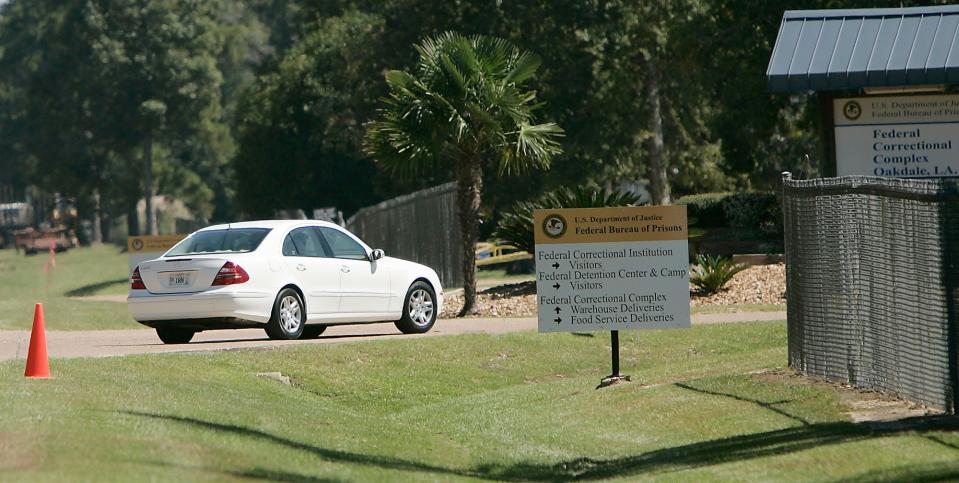'It gets more frightening': As coronavirus surges in prisons, families of elderly inmates wait in fear
Laura Hurwitz’s father, an inmate in a low-security federal prison in Butner, North Carolina, is 79 and in frail health. He survived multiple heart attacks and several bouts with cancer – lung, prostate, throat and nasal.
He also has severe emphysema, high blood pressure, chronic sinusitis, and lung and respiratory issues. Hurwitz said her father is highly vulnerable to dying of COVID-19 and should be moved out of the prison’s close quarters. But whether her father, who has more than three years left in his sentence for bank robbery, can get out is unclear. And Hurwitz, still waiting for answers, is in panic.
“By some stroke of miracle, he is still alive. Clearly with the current pandemic and the level of escalating cases of the virus from the outside, I can only imagine. And it’s hard for me to let myself go there, when I let myself think about what is happening on the inside,” Hurwitz said.
The coronavirus pandemic has forced prison officials to confront difficult questions about who get to spend the rest of their days outside prison walls. The elderly – most at risk of getting sick and dying of the virus – have been the fastest-growing population in federal and state prison systems, in part because of lengthy, mandatory sentences. Thousands are serving time for violent crimes, although advocates have argued that the chance to be released while a pandemic wreaks havoc inside prison walls should not be based solely on the crimes inmates committed in their younger years.
“People change. People age out of crime, especially violent crime. That’s a young man’s game. We can’t make this a binary-nonbinary, violent-nonviolent distinction,” Kevin Ring, president of Families Against Mandatory Minimums, said at a recent question-and-answer session on Facebook Live.
Swamped by COVID-19: Barr speeds release of vulnerable inmates at federal prisons
'Complete chaos': How the pandemic is upending the criminal justice system
Discretionary factors, unclear who qualifies for home confinement
Attorney General William Barr has ordered the Bureau of Prisons to move vulnerable inmates to home confinement. The Justice Department has given prison officials a list of factors to consider, including age, medical condition, behavior in prison and the type of crime. But who exactly qualifies for home confinement isn’t clear, and prison officials have discretion.
The Bureau of Prisons said in a brief statement that facilities, including Butner, are reviewing all inmates who are at risk of getting sick with COVID-19 "to determine if they are suitable for home confinement."
Officials said earlier that they’ve already released 566 inmates to home confinement since Barr issued his order in late March. In a separate order last week, Barr told prison officials to expedite the release of vulnerable inmates at swamped facilities in Louisiana, where five prisoners have died, Connecticut and Ohio.
Crimes plummet: Crime rates drop amid pandemic, but not everyone is safer at home

So far, 15 inmates have tested positive in the prison where Hurwitz’s father, Alan Hurwitz, is housed, according to the Bureau of Prisons. Forty – now the highest of any federal prison in the country – have tested positive at Butner’s medium-security facility. It's unclear if expedited release will also happen at Butner facilities in light of the recent surge in the number of sick prisoners.
Alan Hurwitz, a former school teacher who succumbed to depression, drug addiction and a life of robbing banks – a crime that earned him the nickname “Zombie bandit” because of a vacant look in his eyes – is one of the country’s 20,000 federal inmates age 56 and older. That’s about 11 percent of the prison population.

He's scheduled to be released in 2023, online prison records show. His daughter said she’s been unable to figure out if he can serve the rest of his time in home confinement. Communicating with him has been difficult, she said, as prison officials placed the facility on a lockdown to keep the virus from spreading.
“He hasn’t been given any recent information. We haven’t gotten really any information at all,” Laura Hurwitz said. “Hours and days go by, it gets more frightening.”
Elderly prison population has skyrocketed

In the state prison system, the number of elderly prisoners has exploded.
There were about 23,000 prisoners age 55 and over in state prisons in 1999, according to a USA TODAY analysis of data from the National Corrections Reporting Program by the Bureau of Justice Statistics. That number was at nearly 150,000 – a more than 500 percent jump – in 2016, when most recent data was available. That year, the number of old prisoners in state prisons surpassed the number of prisoners between ages 18 and 24.
Advocacy groups have long urged for the early release of inmates who have grown old in prison, arguing they are more expensive to house because of medical needs and are less likely to re-offend.
Coronavirus in prisons: Prisoners sue for release from virus-plagued federal prison
The coronavirus pandemic has added another layer of urgency to that call, with prison advocates turning to governors, who have broad clemency powers to release inmates.
In Alabama, more than two dozen law professors and former law enforcement officers urged Gov. Kay Ivey to reduce the number of inmates by restarting parole hearings and focus on releasing old and immunocompromised prisoners.
In other state prisons, conditions are more dire.
One hundred and one prisoners have tested positive in Illinois prisons; 95 of whom are at Stateville Correctional Center. Forty-one prison staffers have tested positive; more than half work at Stateville.
In Louisiana, advocates sought a temporary restraining order amid media reports that prison officials are planning to move sick jail inmates to the state penitentiary in Angola. The facility houses a large population of elderly and sick inmates.
“It just seems like a total recipe for disaster,” said Mercedes Montagnes, executive director of The Promise for Justice Initiative. The group sued the state a few years ago over inadequate medical care at the Angola prison, where elderly inmates suffer from diabetes, asthma and heart and lung conditions. A judge denied the request for a restraining order, which would have blocked officials from moving sick jail inmates to the Angola prison. Montagnes said they’re looking at other options.
Bracing for the worst: As police get coronavirus, public safety in the US could suffer
'This is called a death camp'
Inside prison walls, masks and hygiene products are scarce, said Tracy Dunlap, another federal inmate at Butner. There are four hand sanitizer dispensers inside the facility, but they're all empty now, Dunlap said. Prisoners were each given one mask, he added, but that was a week ago.
On Monday evening, Dunlap said he and other inmates were crowded into another unit with dozens of other inmates after his unit was closed. He said he was told officials will use their unit to isolate sick people.
“You can’t get five feet away from anybody. It’s just packed. I slept with people within 5 feet of me last night,” Dunlap said Tuesday.
Like Alan Hurwitz, Dunlap, 77, said he’s also waiting to hear about whether he’ll be released. He said he was told he’s on a list of inmates who’ll be moved to home confinement, but that was a week ago and he hasn’t heard anything else since.
“I don’t know what they’re doing,” said Dunlap, who’s serving time for wire fraud and money laundering and is set to be released in 2025. “This is called a death camp.”
And like Laura Hurwitz, Deana Kime, Dunlap's daughter, waits in fear.
"I'd hate for this thing to take him down and we never see him again," Kime said.
This article originally appeared on USA TODAY: Coronavirus: Prisons weigh who to set free as risks rise for elderly
